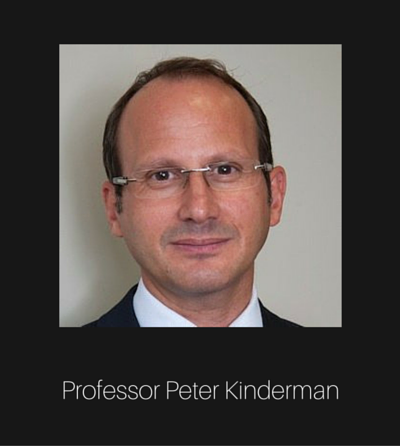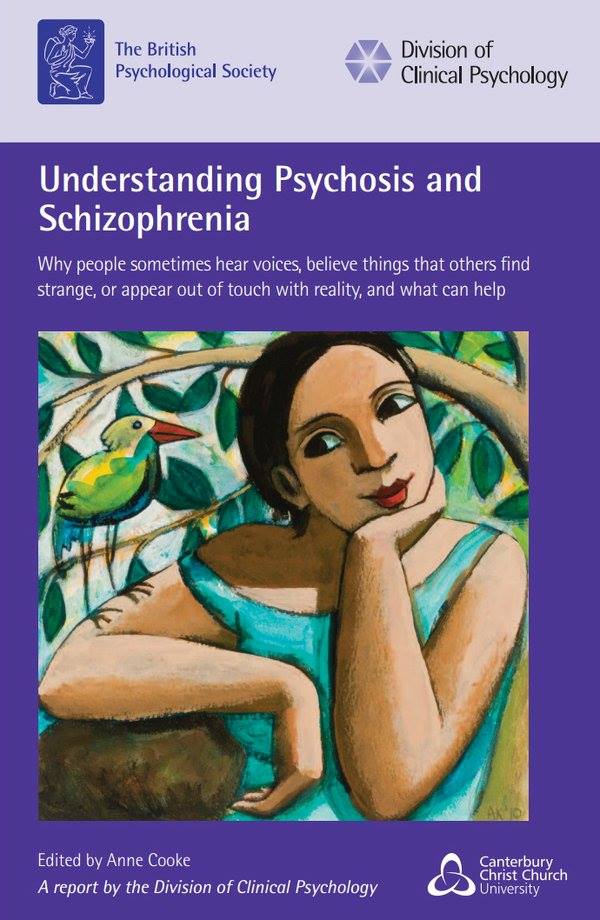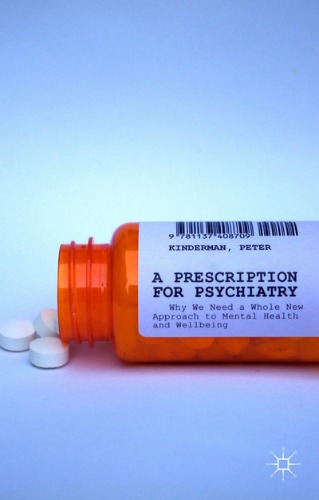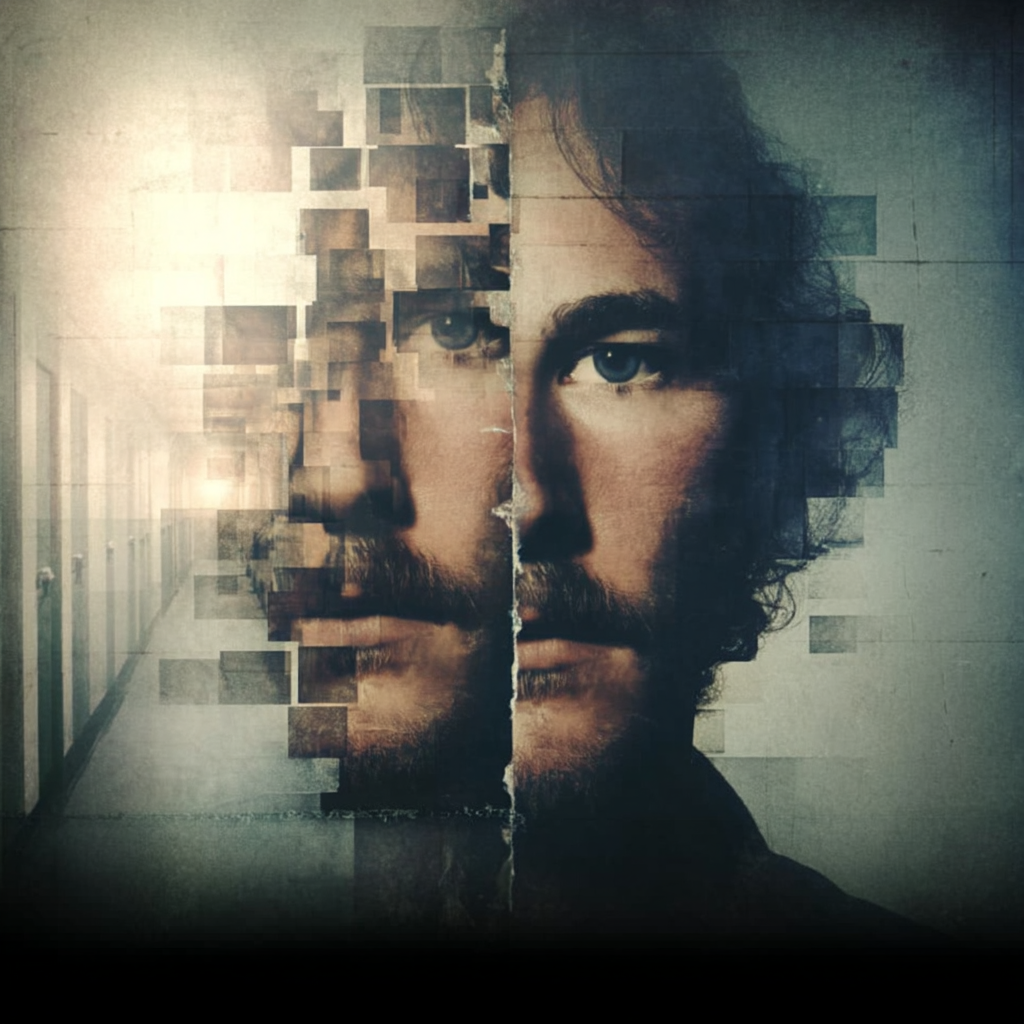Psychology Classics On Amazon

Interview with Professor Peter Kinderman
Peter Kinderman, Ph.D., is Professor of Clinical Psychology at the University of Liverpool and an honorary Consultant Clinical Psychologist with Mersey Care NHS Trust. He is also Head of the Institute of Psychology, Health and Society at the University of Liverpool, with over 220 academic staff (32 of them professors) comprising psychiatrists, GPs, clinical and other applied psychologists, sociologists, public health physicians, nurses, sociologists and academics.
Professor Kinderman's research interests include the psychopathology of schizophrenia, bipolar disorder and personality disorder and he has been instrumental in developing internationally renowned models of paranoid thought and mania which form the basis of recognised therapeutic interventions.
A highly sought-after expert within broadcast media, Professor Kinderman has contributed to several productions in the field of mental health, most notably hosting a two-episode BBC Horizon show exploring the role of diagnosis in mental health.
Q & A
What led you to specialise in clinical psychology?
My career has been pretty conventional - I studied general sciences, then psychology, and clinical psychology was the most interesting, most apparently useful, route to follow. There wasn’t a moment of epiphany. But it’s true that I grew up with a desire to understand why my older brother had experienced his serious mental health problems, and I was aware that I certainly didn’t want to place myself at similar risk. So I was always interested in mental health issues from a young age. Studying mental health as a psychologist therefore made a lot of personal sense.
Whose ideas within the field have influenced you the most?
Just after I qualified as a clinical psychologist, I had the chance to pursue a combined academic and clinical career by working with Richard Bentall, who became my PhD supervisor and general inspiration, mentor, colleague and occasional sparring partner.
Richard has been my closest collaborator and most important source of inspiration over the subsequent twenty-five years of our work together, and a significant proportion of my scientific and professional views have been shaped by his impressive brain.
Listed among your research activity is how psychological science can assist public policy in health and social care. Could you give an example of this in action?
There are many examples. Human factors are central to all the work of both civic society and Government. The profession and discipline of psychology - and in my case the British Psychological Society - is the natural home of experts in: relationships, education and learning, mental health, health, politics, sport, crime, work and organisational structures, prejudice and intercultural understanding, designing and working with emerging technologies, and more. Our profession and discipline is based on our science, our professional practice and our values. So psychological science is fantastically important (and fantastic).
Personally, I have published trials of psychological therapies, argued for the wider use of psychosocial approaches in mental health care, campaigned against the inappropriate use of medical labels in what I believe is not, primarily, a medical issue. I’ve argued that we should stop talking about 'abnormal' psychology. I sat on the UK Department of Health’s Mental Health Advisory Board (the UK Government’s key stakeholder group for mental health policy) and New Ways of Working National Steering Group (responsible for healthcare workforce development and re-design). In these two roles, I have had a significant impact on mental health care and my professions, improving the role of psychologists, enhancing the contribution that psychologists can contribute to care, and contributing to the development of fellow professions. I was also a consultant to the BBC Headroom campaign and has contributed to several broadcasts in the field of mental health, most notably hosting a two-episode BBC TV Horizon piece exploring the validity of psychiatric diagnosis.
I currently sit on the Liverpool City Council’s Health and Wellbeing Board, responsible for oversight of health and social care provision for the city. In 2010 I joined the Office for National Statistics’ Technical Advisory Group for the measurement of National wellbeing. I have also given written and oral evidence to a range of UK parliamentary Committees and commissions of enquiry, including the Mental Health and Mental Capacity Bill, the Disability Discrimination Bill, the creation of a new UK Equality and Human Rights Commission, the UK Anti-terrorism, Crime and Security Act, the care and treatment of asylum-seekers, and proposals to reform the law in respect to diminished responsibility in criminal cases. The drafting of the Mental Capacity Act and the reforms to the Mental Health Act saw me engaged in detailed negotiations with Ministers of State, parliamentary and other stakeholders, and parliamentarians at National Assembly, UK and EU level. Again, key elements of Government policy, and again controversial with my colleagues, these legislative negotiations were crucial to the development of my own profession as well as driving forward regulatory safeguards for health and social care.
I am also proud of having spoken out on other areas of concern for my professional colleagues. I am principally responsible for drafting a Declaration on behalf of the British Psychological Society repudiating the involvement of psychologists (and other professionals) in the abuse of detainees and in torture – an issue where I believe I and my professional body can show genuine leadership for professionals in other Nations.
In the article - Changing Society’s Whole Approach to 'Psychosis' - your colleague Anne Cooke recalls a time in 1999 when you both "felt a sense of despair at the widespread misinformation and atrocious stereotypes that were dominating media coverage of mental health at the time."
To what extent do you think media coverage of mental health has changed since then? And which mental health myths would you say remain the most pervasive?
|
The media coverage of mental health issues has improved. I think, in part, that’s because we’ve been able to outline a scientific as well as professional and moral case - effectively we’ve demonstrated that the media myths are simply incorrect. But I think there’s also leadership, by celebrities but most importantly by politicians being open about their mental health problems. |
|
The residual myth is still that our more distressing emotions such as grief and anger can best be understood as symptoms of physical illnesses. This myth is pervasive and seductive, but flawed. We must move away from the disease model, which assumes that emotional distress is merely symptomatic of biological illness, and instead embrace a model of mental health and well-being that recognizes our essential and shared humanity. Our mental health is largely dependent on our understanding of the world and our thoughts about ourselves, other people, the future and the world. Biological factors, social factors and circumstantial factors — our human experience — affect the key psychological processes that help us build up our sense of who we are and the way the world works.
SPECIAL NOTE
Edited by Anne Cooke and including a contribution by Professor Peter Kinderman, 'Understanding Psychosis and Schizophrenia' is an outstanding free resource that you can download for free along with another must read public information document 'Understanding Bipolar Disorder.' You can access both publications via the link above or by clicking on the following image.
Could you explain what you mean by a 'psychosocial model' of mental health care? And briefly outline - as you contend in your book 'A Prescription for Psychiatry' - why this model of mental health care should be adopted in place of the current biological 'disease model?'
This is the alternative to the 'disease-model' myth. A psychosocial model means that we understand that our mental health is largely dependent on our understanding of the world and our thoughts about ourselves, other people, the future and the world. Biological factors, social factors and circumstantial factors — our human experience — affect the key psychological processes that help us build up our sense of who we are and the way the world works.
I’m loath to summarise a whole book in a few words, but I’m arguing that services should be based on the premise that the origins of distress are largely social. The guiding idea underpinning mental health services needs to change; from an assumption that our role is to treat disease to an appreciation that our role is to help and support people who are distressed as a result of their life circumstances.
This also means we should replace traditional diagnoses with straightforward descriptions of problems. We must stop regarding people’s very real emotional distress as merely the symptom of diagnosable 'illnesses'. A simple list of people’s problems (properly defined) would have greater scientific validity and would be more than sufficient as a basis for individual care planning and for the design and planning of services. This does not mean rejecting rigor or the scientific method — quite the opposite. While psychiatric diagnoses lack reliability, validity and utility, there is no barrier to the operational definition of specific psychological phenomena, and it is equally possible to develop coherent treatment plans from such a basis.
All this means that we should turn from the diagnosis of illness and the pursuit of etiology and instead identify and understand the causal mechanisms of operationally defined psychological phenomena. Our health services should sharply reduce our reliance on medication to address emotional distress. We should not look to medication to 'cure' or even 'manage' non-existent underlying 'illnesses'.
We must offer services that help people to help themselves and each other rather than disempowering them — services that facilitate 'personal agency' in psychological jargon. That means involving a wide range of community workers and psychologists in multidisciplinary teams, and promoting psychosocial rather than medical solutions. Where individual therapy is needed, effective, formulation-based (and therefore individually tailored) psychological therapies should be available to all. When people are in acute crisis, residential care may be needed, but this should not be seen as a medical issue. Since a disease model is inappropriate, it is also inappropriate to care for people in hospital wards. A different model of care is needed.
Adopting this approach would result in a fundamental shift from a medical to a psychosocial focus. It would mean a move from hospital to residential social care and a substantial reduction in the prescription of medication. And because experiences of neglect, rejection and abuse are hugely important in the genesis of many problems, we need to redouble our efforts to address the underlying issues of abuse, discrimination and social inequity.
This is an unequivocal call for a revolution in the way we conceptualize mental health and in how we provide services for people in distress, but I believe it’s a revolution that’s already underway.
You can get hold of Professor Peter Kinderman's critically acclaimed book via the following link.
What would you say is the most effective way of engaging with the general public when it comes to promoting the very best psychological science and practice?
I think we’re getting better at it. We’re getting better at writing for a general audience. Mainly, I think people are nervous - they try too often to hide their uncertainty about things (and, of course, we don’t know everything, or indeed much at all) with academic language and obscure phrases. So I guess I’d urge people to write as simply and clearly as possible and, if they then find that they are at a loss to explain something, or if they can’t think how best to phrase a difficult issue, that suggests that there is more thinking to do.
But also... there are experts out there. So we (psychologists) should work with journalists, and help them communicate with the public - they’re better at it than us. The BBC, for me as a psychologist working in the UK, is a fantastic institution, and BBC journalists are both expert and enthusiastic in explaining science to the public. So... the most effective way of engaging with the general public when it comes to promoting the very best psychological science and practice is to work with journalists.
Could you tell us about your free online course 'Psychology and Mental Health: Beyond Nature and Nurture?'
The course - it’s available at futurelearn.com/courses/mental-health-and-well-being - is designed to let people think about biological, social and psychological influences on our mental health, and, crucially, how these different elements work together. Psychological therapies and the work of clinical psychologists are now very popular.
This course provides an introduction to how psychologists understand emotions, behaviours and thinking patterns, and how this helps clinical psychologists make sense of their clients’ problems. The course is aimed at anyone who wishes to understand more about psychology, about mental health or who wishes to maintain their own mental health and well-being. No previous experience is required; learners are introduced to some important contemporary academic texts based on psychology and sociology.
In mental health, perhaps more than any other area of science, there are huge differences of opinion. The 'nature-nurture' debate is important; people differ profoundly in respect to how much they believe our mental health and well-being are products of our biology (on the one hand) or life-events (on the other). So learners on this course explore some of the current challenges and debates in the area of diagnosis and treatment and discover new ways of thinking psychologically about mental health. The course gives learners new perspectives on the 'nature vs nurture' debate. It helps learners understand the ways in which we are affected by life experiences and discussed new research which promises to help us improve our own mental health and well-being.
What one piece of advice would you give to someone who wants to become a clinical psychologist?
Just do it.
Well... OK, study psychology as an undergraduate, get some work experience and then apply for a training course. But, generally, just do it, it’s great profession.
Having been elected President of the British Psychological Society for 2016-17, what will be your primary goal during your term of office?
My goals are pretty straightforwards. The BPS has a key objective of promoting psychological science for policy makers and the public. That objective clearly sits well with me, so I merely want to make the BPS as effective as it can be. Hopefully, I’ll be able to make some (rather dull) changes to the way the Society works to make it more effective, but I merely want to help it achieve its existing aims.
I guess I would just say that the BPS shouldn’t exist to promote its own interests, nor even, principally, to promote its members’ interests - it’s a charity, and it should have a primary aim to bring psychological science, values and professionalism to bear for the benefit of the general public.
Connect With Professor Kinderman
Visit Professor Kinderman's Academic Webpage
Read Professor Kinderman's Blog
Follow Professor Kinderman on Twitter
Recent Articles
-
Billy Milligan Case Study: Psychology, Crime, and the Split Mind
Apr 18, 25 09:10 AM
Was Billy Milligan a fractured victim—or a manipulative genius? This Billy Milligan case study explores the psychology behind one of history’s most controversial trials. -
Borderline Personality Disorder: More Than Mood Swings
Apr 18, 25 07:11 AM
Discover key facts about Borderline Personality Disorder, its symptoms, causes, treatment options, and why raising awareness is vital. -
Psychology Book Marketing
Apr 17, 25 04:56 AM
Psychology book marketing. Ignite your book's visibility by leveraging the massive reach of the All About Psychology website and social media channels.
Go Back To The Psychology Expert Interviews Page
Go From Peter Kinderman Q & A Back To The Home Page










New! Comments
Have your say about what you just read! Leave me a comment in the box below.